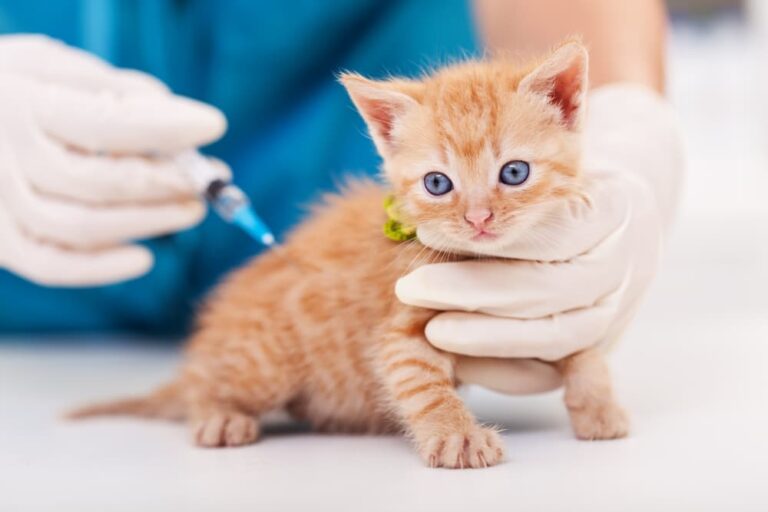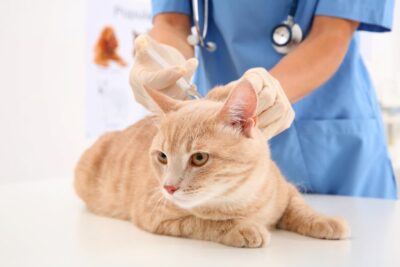Everything You Need To Know About Cat Vaccinations

Cat vaccinations are one of the most debated topics in the pet world. Knowing what vaccinations for your cat are necessary and which ones are optional can be confusing.
In this article, we provide detailed answers to some of the most frequently asked questions on cat vaccinations.
Do I Need to Vaccinate My Cat?
The answer to this question is yes.
According to the American Association of Feline Practitioners, your cat should be vaccinated. Cat vaccinations are also scientifically and medically proven to be beneficial. Such vaccinations minimize the transmission of fatal diseases and viruses that can cause lifelong illness in cats.
Furthermore, vaccinating your cat against diseases such as rabies ensures that you and other animals in your home are safe from fatal diseases.
When Should You Vaccinate Your Cat?
If you just brought a kitten into your home, you’ll first need to find out if they are vaccinated.
Kitten vaccines typically start between 6 to 8 weeks of age, depending on the vaccine, medical history, and the person administering the vaccine. The vaccines are then administered in a series every three to four weeks until the kitten reaches at least 16 weeks of age. This series of vaccines are not the same for every kitten, and will vary slightly depending on when they received their first vaccines and their lifestyle. These vaccines are typically boostered at 1 year of age.
If you have an adult cat who has never been vaccinated, you’ll need to talk to your vet. The vet will advise you on the best vaccines for your fur baby after considering their age, lifestyle, breed, location, and pre-existing medical conditions.
Adult cats who have already been vaccinated will need booster shots after 1-3 years, depending on the duration of the vaccine, location, and lifestyle.

What vaccines do I need to give my cat?
According to the Feline Vaccination Advisory Panel guidelines, cat vaccines are divided into two categories:
- Core shots
- Non-core shots
Core Cat Vaccines
Core vaccines are required for all cats. These vaccines protect against diseases that are highly contagious and fatal. The core vaccines also have minimal adverse effects on cats.
The two essential vaccines for cats are:
- Rabies
- FVRCP
- Feline viral rhinotracheitis
- Feline calicivirus
- Feline panleukopenia virus or feline distemper
Let’s take a closer look at each of these vaccines:
Rabies vaccine
The rabies virus is fatal to both humans and animals. Most states require that your cat be vaccinated against rabies. Cats get rabies after being infected by other sick animals, and they then pass on the virus to others. Some of the symptoms of this disease in your cat include wobbly while walking (ataxia), aggression, and death.
The FVRCP vaccine
This vaccine is also known as the distemper shot. It’s a single shot given to protect your cat against the three viruses below:
- Feline viral rhinotracheitis (FVR): This virus, also known as feline herpes, is caused by feline herpesvirus type 1 (FHV-1). It affects a cat’s respiratory system and is characterized by conjunctivitis, nasal congestion, and sneezing. The disease can also lead to pneumonia.
- Feline calicivirus (FCV): Feline calicivirus affects a cat’s upper respiratory organs. Signs of this virus include oral ulcerations, sneezing, nasal discharge, gingivitis, and even death.
- Feline panleukopenia virus (FPV): This highly infectious illness is characterized by poor appetite, lack of energy, diarrhea, vomiting, and even sudden death in kittens.
Your cat should get booster shots of these core vaccines one year after the initial shots. After the initial one-year adult booster, FVRCP vaccines are typically given every three years. However, if your cat is high-risk, your veterinarian may recommend annual FVRCP vaccination.
Non-Core Cat Vaccines
Your fur baby may need extra vaccines depending on the prevalence of illness in your area and the amount of time they spend outdoors. These shots are non-core vaccines. Some of the most common ones include:
- Chlamydia: This shot protects your cat from chlamydia, a bacterial infection that leads to conjunctivitis. This shot is sometimes part of the FVRCP vaccine.
- Feline leukemia virus (FeLV): This vaccine is highly recommended for outdoor cats. The virus is transmitted through body fluids, such as saliva and urine. Although some cats recover from this disease, others suffer from secondary illnesses, such as anemia or lymphoma, once the disease goes past the latency stage.
- Bordetella: This vaccine is strictly for catteries and animal shelters in which Bordetella infection is a confirmed issue for their entire population. This disease is highly contagious and causes respiratory symptoms, such as sneezing, fever, difficult breathing, and nasal discharge.

Do Cat Vaccines Have Severe Side Effects?
Each of the vaccines highlighted above carries a given amount of risk. However, these risks are much lower than the risk of your cat getting the highlighted diseases.
The effects of these vaccines on your cat are often mild, and they occur in only about 0.5 percent of all vaccinated cats. Death and other adverse outcomes are extremely rare. If your cat has no history of vaccine reactions, they will likely be okay.
Some of the symptoms you can look out for that may be an indication of a vaccine reaction in cats include:
- Fever
- Lameness
- Swelling and redness on the injection area
- Vomiting
- Lethargy
- Hives
- Diarrhea
If you notice any of these signs, consult your vet immediately to ensure your cat gets immediate care.
Cats in particular are at risk for injection site sarcomas from receiving vaccines and other injections. Although rare, these malignant tumors will develop at the site of an injection. Fortunately vaccines have been developed to minimize the risk of these tumors. Speak with your veterinarian about the best option for your cat. If you feel a bump has developed at the site of an injection, see your doctor as soon as possible.
Keep Track of Your Cat’s Vaccination Records
After vaccinating your cat, stay organized by keeping track of your cat’s vaccination records. Consider setting vaccination reminders, so you’ll get a notification when your cat is due for another round of shots.
Understanding the importance of vaccinating your cat is vital to being a good pet parent. If you have a new kitten or your adult cat isn’t up-to-date with their vaccinations, schedule a visit with a vet immediately so you can agree on a vaccination schedule.









